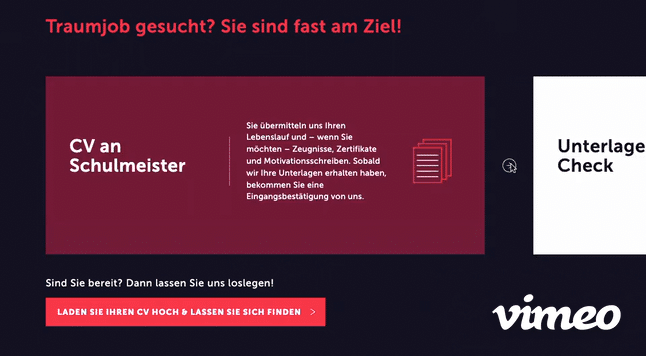What problems are there in the recruiting process right now?
A study conducted by Stepstone in 2021 with 1,142 respondents showed that most applicants are dissatisfied with the recruiting process. Overall, they have only given an average rating of 4 out of 10 points in the last three application processes. That doesn't have to be the case!
Job candidates were asked what bothers them most in the application process and what they expect from companies. If companies avoid the following five "deadly sins", they can stand out and gain a strong competitive advantage.
Problem 1: Radio silence and lack of communication
A big frustration factor for applicants is the lack of communication during the application process. Many only find out after weeks or months that they have not been selected for the advertised position or do not hear anything at all from the company. Almost 60% of the Stepstone study participants say that this bothers them the most.
This leads to uncertainty and frustration as applicants invest time and effort to prepare an application and prepare for the job. Companies should therefore maintain clear and quick communication and provide regular updates.
Schulmeister HR Hack: Optimise your own process
Only if your own recruiting process is well defined and optimised will the experience for the applicant be uncomplicated and positive. Ask yourself the following questions:
- What does your application process look like internally?
- Are you using the right tools?
- Do you take detours or have intermediate steps that slow down the process?
- Do you work with resubmissions and follow-ups?
- Is your HR team well trained and everyone up to date?
Problem 2: Complicated application process & lack of transparency
A clear and transparent application process is the be-all and end-all. The simpler the process is defined, the greater the chance that applicants will ultimately accept a job - according to 86% of respondents to the Stepstone study.
It is often helpful if the recruiting process is transparent from the beginning. This includes, for example, that the company indicates how many rounds of applications there will be and how long applicants will have to wait for feedback. Unfortunately, there seems to be a need to catch up here: According to the Stepstone survey, 25% of respondents only gave a score of 4 for the transparency of companies with regard to the process, duration and decision-making.

Another problem is that female applicants often do not know who is responsible for the application process and who their contact persons are. This is another area where there is often a need for improvement in order to give applicants the feeling that they are in an open and trusting exchange with the companies.
Schulmeister HR Hack: Creating Clarity
Potential candidates should always know what to expect and how the process works. Add a process graphic or a detailed timetable with the individual steps to your career page on the homepage. Applicants will also feel more at ease if you include a clear contact point for queries and information in the advertisement.
PS: We ourselves do it that way too ;) Click here for our presentation >>
Problem 3: Job ads without meaning
A job ad should inform and arouse curiosity. But unfortunately, this is often not the case. Many job ads are not only too general, often the most important information is missing. Part-time or full-time? What salary is envisaged? There is nothing about home office.
This leads to potential new employees not feeling addressed and not applying. Job seekers want not only a description of the activities and requirements of the job, but also as much information as possible about the potential employer.
- In addition to working hours (63%), applicants are particularly interested in home office arrangements and flexible working models (48%).
- According to the Stepstone survey, three out of four respondents would like to see salary information in job ads. A full 96% of respondents even say that the likelihood of applying increases if a salary is stated.
Schulmeister HR hack: taboo subject of realistic salary information
Probably the most important piece of information is still the salary. We know how critical this topic is.
- Some companies fear that by stating the salary they may attract candidates, who already have a higher salary expectation than the company can offer.
- Companies often want to keep some room for negotiation when it comes to salary.
- Some companies feel that disclosing the salary could undermine the transparency of the company, especially if the company operates in an industry where high salaries are the exception rather than the rule.

We advise our clients: If possible, state a realistic salary!
This not only differentiates your job advertisement from others, but also creates trust and transparency. In addition, applicants can quickly decide whether the job fits into their salary budget or not. This saves time for both sides.
Companies can get creative when presenting the salary: Surveyed applicants find detailed salary ranges (89%) or the indication of an average salary (82%) particularly appealing.
Avoid common phrases such as "above-average salary", as this information is simply not concrete enough for many.
*We also give salary ranges in our job ads.
The CV is updated, the references are complete and the letter of motivation is finally in place. The "apply now" button is pressed.
And then? For many applicants, it's a case of waiting and waiting and waiting. They have to wait - often for a very long time - and sometimes even in vain. In many cases there is no response to the application. Almost 60% say that this is particularly frustrating.
Another problem is the lack of feedback after the interview. Many would like to know how they did in the interview and if there is room for improvement. But often they hear nothing more from the company. Companies should therefore make sure to give brief feedback after the interview.
Schulmeister HR hack: A short conversation is better than no conversation.
Even if the candidate may not meet all the requirements, give him or her a chance to introduce him- or herself. The lack of previous experience can often be compensated for by appropriate induction and training. And the self-assessed A2 English skills turn out to be C1 professional language skills after all.
Coordinate uncomplicated "30-minute get-to-know-you meetings" via teams - that's what we do. This way you keep your internal time expenditure low and can still get to know the potential candidates.
Problem 5: Impersonality & lack of individualisation
Application forms, automation and standardised rejection texts make the life of every HR manager easier - including ours. But the impersonality and lack of individualisation is another frustrating hurdle in the application process. There are many applicants who would like more personal and transparent communication. 30% of respondents feel that companies do not take enough time to get to know candidates properly and give them a chance to present themselves.
Schulmeister HR hack: The more digital, the more human
With all the automatisms and standardisations, don't forget the "human" component. Every job search has an enormous impact on your entire personal life. Put yourself in the shoes of the applicant for a moment or think back to your last job search...
- How nervous are you at the beginning of your career before interviews?
- How often have you not said half the things you actually wrote down beforehand and wanted to mention?
- How grateful is one for constructive feedback from experienced professionals?
- How good is it to know what to expect and where you stand?
Take your time, write this individual rejection letter and respond to follow-up questions from applicants.




![[Translate to English:] frustrierter Mann schreit ins Telefon und hat Probleme mit Bewerbungsprozess.](/fileadmin/user_upload/02_blog___news/schulmeister-bewerbungsprozess-probleme.jpg)


